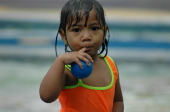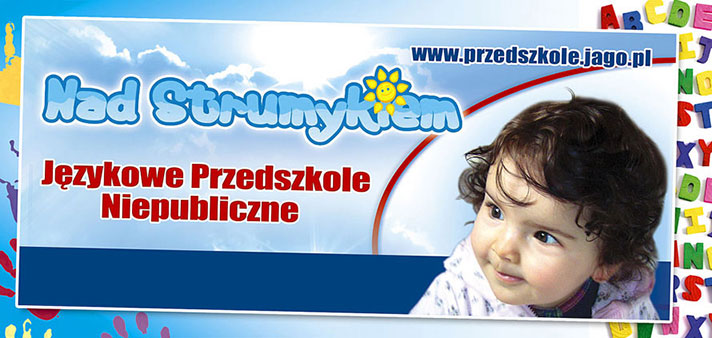
Most research confirms that the earlier a child encounters a second language, the greater are his/her chances of using it as fluently as their own.
A child that starts learning a foreign language even as an infant (the ability naturally disappears after the age of 7-8) is able to master - for their whole life -pronunciation which is comparable with the native speaker's, practically with no features of a foreign accent.
Many linguists attribute the ability to the changes taking place in the developing brain of the small child which is creating in this period new, neurological connections each time a child actively interacts with the new language surroundings.
Of course the matter of time is also crucial here - the more years we devote to language learning, the better we become, as in any other discipline of science or sport.
Following the latest research and achievements in the realm of language learning acquired in the course of over 12 years of language teaching in JAGO Foreign Language Teaching Centre, we decided to utilize our long-term experience in teaching languages to the youngest.
That is why in our bilingual kindergarten we used the innovative method of complete language immersion. In the method children spend a significant portion of time or all their kindergarten stay either using or having direct contact with the target language. Such complete immersion in a foreign language in early childhood builds a long-term linguistic foundation to build on later on in life.
It was proved that children use their right hemisphere in language learning, and that the ability changes with age. The right, empirical hemisphere responsible for the senses, enables the acquisition of language from all types of sources: audio, emotional or tactile or based on practical experience, with the passage of time, the "adult" left hemisphere, based on logical thinking, becomes dominant.
Another essential fact is that children at preschool age, starting as early as the age of three, acquire language solely using their memory, through here and now activities, hence the more frequent the contact with language, the better.
That is why the method of language immersion, as used in our kindergarten, where children practically do not learn but instead experience the language in real life situations in the amount of over 20 hours weekly, is very successful.
The further increase of its efficiency is influenced by the fact that the frequent guests in our kindergarten include carefully selected foreign language teachers (native speakers) from Great Britain, the USA or Germany ensuring the example pronunciation model of a given tongue.
The essential factor in a fully safe and joyful experience by our little guards of the days full of language adventures is also the fact that the foreign language teachers who have contact with children have the basic ability to communicate in the Polish language.

What language shall I choose?
The Non-Public Language Kindergarten "Nad Strumykiem" offers 5 foreign languages: English for everyday purposes and - to choose from: German, French, Spanish or Russian.
In our kindergarten it is parents who decide what languages their child will learn. While the majority of people in Poland (aged 35-64) admit they can speak Russian, it is English that has pushed out all other languages and become lingua franca (the common language of people who use other languages on everyday basis) of the modern world.
Each kindergarten group follows the curriculum of a given language with its teacher – a language specialist, while the more mature groups (beginning at the age of four) may select an additional language (already included in the kindergarten fee).
The advantages and benefits of learning languages using the language immersion method from an early age:
- there is no need to drive children to additional language courses (thus saving time and money); additionally, a child feels safe in the surroundings of the kindergarten where they acquire language with teachers and peers that are known to them to a far bigger and effective extent than is the case with traditional language courses, which will enable them eventually to become a bilingual user of the languages,
- children at preschool age are usually characterized by an increased level of interest and that is why they learn about other nationalities more easily,
- learning a foreign language through immersion develops communicative skills even in the mother tongue of the child,
- children become more creative, their self-esteem is higher and they are able to solve complex problems,
- in most cases learning of a foreign language through immersion also helps in learning other subjects as long as it lasts,
- acquaints children with various cultures and ways of expressing themselves, expands the way they perceive the world and gives them the ability to communicate with a far bigger number of people,
- the child learns additional languages more easily, even later, when s/he is already a grown up,
- our kindergarten is an excellent choice for children from mixed-nationality backgrounds who use two languages at home on daily basis,
- the tolerance of other cultures and nations is fostered,
- children accumulate linguistic and cultural experience, which has positive influence on their general development (cognitive, social, cultural, acoustic, linguistic and personal), as well as the level of determination and participation,
- children possess an inborn ability to learn in an unconscious way, which is especially true of languages, at the early stage of development - all they need to activate it is movement, smile, activity and joy, so this is no longer learning but play!
- a long-term benefit: the fluent knowledge of one or two languages in the future will make it significantly easier to find a better job.
You can find more information concerning the benefits of the immersion method to your child below (both documents in Polish):






